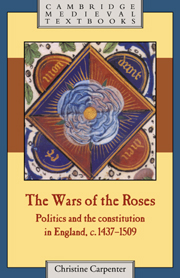Book contents
- Frontmatter
- Contents
- List of illustrations
- Preface
- Introduction
- 1 Sources and historiography
- 2 The governance of England in the fifteenth century I: kings, kingship and political society
- 3 The governance of England in the fifteenth century II: nobility, gentry and local governance
- 4 The Lancastrian kings to c. 1437
- 5 Henry VI's adult rule: the first phase c. 1437–1450
- 6 The road to war: 1450–145
- 7 The end of Lancastrian rule: 1455–1461
- 8 Edward IV's first reign: 1461–1471
- 9 The triumph of York: 1471–1483
- 10 Richard III and the end of Yorkist rule: 1483–1485
- 11 Henry VII and the end of the wars: 1485–1509
- 12 Conclusions
- Bibliographical notes
- Index
- Cambridge Medieval Textbooks
11 - Henry VII and the end of the wars: 1485–1509
Published online by Cambridge University Press: 05 June 2012
- Frontmatter
- Contents
- List of illustrations
- Preface
- Introduction
- 1 Sources and historiography
- 2 The governance of England in the fifteenth century I: kings, kingship and political society
- 3 The governance of England in the fifteenth century II: nobility, gentry and local governance
- 4 The Lancastrian kings to c. 1437
- 5 Henry VI's adult rule: the first phase c. 1437–1450
- 6 The road to war: 1450–145
- 7 The end of Lancastrian rule: 1455–1461
- 8 Edward IV's first reign: 1461–1471
- 9 The triumph of York: 1471–1483
- 10 Richard III and the end of Yorkist rule: 1483–1485
- 11 Henry VII and the end of the wars: 1485–1509
- 12 Conclusions
- Bibliographical notes
- Index
- Cambridge Medieval Textbooks
Summary
Study of Henry VII's reign is at a problematic but interesting turning point at the moment. For a long time it was left to the Tudor historians, for it was understood that Tudor history and the ‘modern age’ started in 1485. The trouble was that the reign does not really fit with the Tudor historiographical traditions. These have focused on parliamentary and administrative history and the progress of the Reformation, and, apart from some local studies, have until recently been to a large extent devoid of internal politics. Late-medieval history, on the other hand, in the McFarlane era, has put politics, especially high politics, at the centre of its concerns and it is becoming increasingly clear that the same should be true of Henry VII's reign. The neglect of politics under Henry VII has been given added impetus by the fact that the sources for the reign are still very much the same as those for late-medieval history and therefore pose similar difficulties. During the reign of Henry VIII, the class of documents known as State Papers begins, and this tells us far more about what the government was doing and why. Moreover, there is a general multiplication of informative sources, particularly of private papers, in the course of the sixteenth century. All this makes political history much easier.
- Type
- Chapter
- Information
- The Wars of the RosesPolitics and the Constitution in England, c.1437–1509, pp. 219 - 251Publisher: Cambridge University PressPrint publication year: 1997

